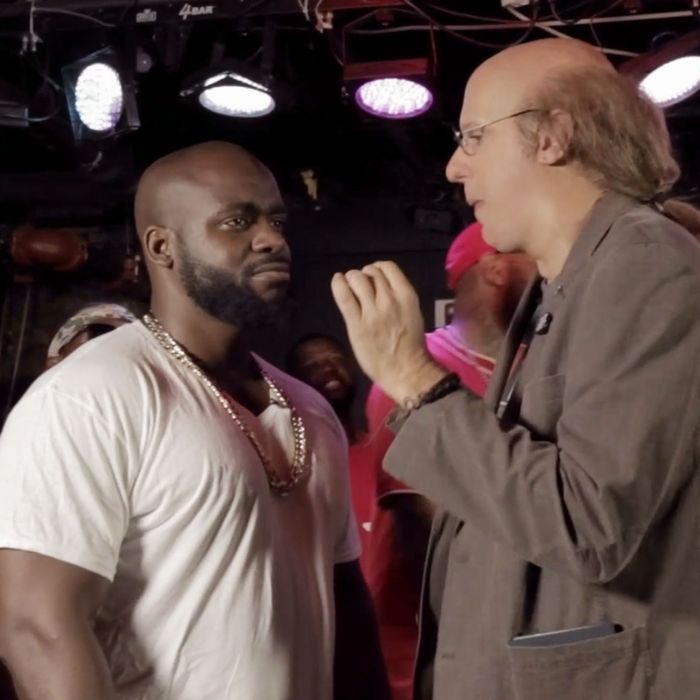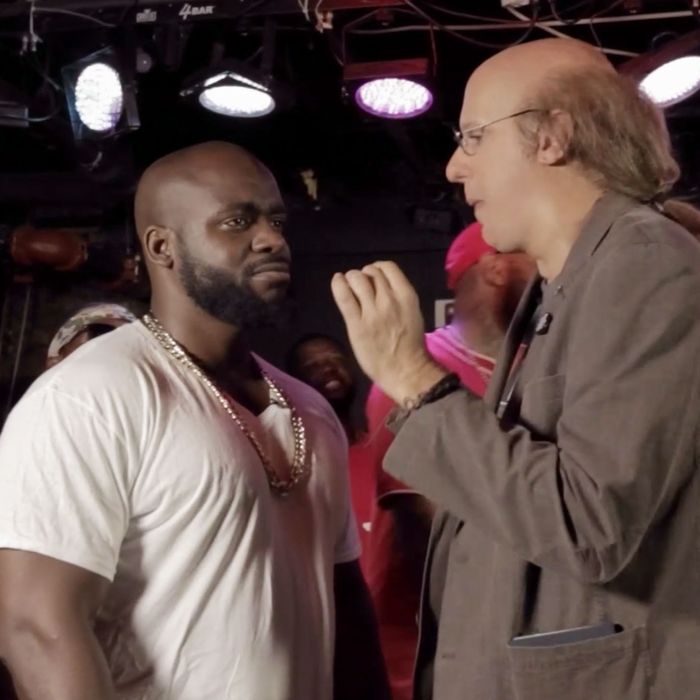
In his ongoing, disastrous quest of “healing the divide” in our country, this week’s Who Is America? episode finds Sacha Baron Cohen’s Dr. Nira Cain-N’Degeocello character traveling to Atlanta to engage in a rap battle with local legend Ness Lee. Despite Dr. Nira insisting on snowflake levels of political correctness in his bars — “I would say I’m slightly easy to be triggered / Please respond respectfully” — he ends up getting a surprisingly great reception from the crowd, thanks to his “macrophallus” musings and unflinching support of his wife’s infidelity, should she ever choose to sleep with his battle opponent. (“I would approve of it / It’s happened in the past / I’ll wait outside the yurt and I’d listen to a podcast with noise-canceling headphones / To drown out any of her moaning.”) Ness looked like he had a pretty good time with the prank, so Vulture gave him a call to learn more about his Who Is America? experience.
Do you consider it a badge of honor that, out of all of Atlanta’s prominent battle rappers, you were chosen to face off against Sacha Baron Cohen?
I do, I do. It’s absolutely a pat on my back, in that I’ve been around Atlanta battle rap for so long. I was one of the first people to participate in battle rap. I’m one of the ones from the original era that’s still around. It’s like a lifetime achievement. [Laughs.]
How were you actually introduced to this Dr. Nira character? Who arranged the battle?
A few people were involved. I got my homeboy Adam Ferrone, he goes by Rone. He’s one of the more prominent battle rappers out there, everybody knows who he is. He apparently gave somebody my number last year, and they, in turn, searched me on YouTube, liked what I did, and contacted John John Da Don, who’s on camera behind both of us and hyping both of us up. He owns the league where we participated on, called BullPen Battles. Showtime contacted him about me battling a … he said it would be a weird battle. I would be battling a college professor. They said cameras would be following him around for the next few weeks as he delved into the urban culture. He’s a super-far leftist and he really wanted to indulge in a life with the people he fought for for so long. So I’m like, “Okay, I guess we could do that.” They paid me what I asked for. It was so crazy, because they really play up to being a low-budget production. They paid me in fives and ones, and they shorted me, like, four dollars. [Laughs.] I’m definitely not mad at that at all. They were definitely trying to keep up the image of being some college project that happened to end up on Showtime.
After it all happened, I went home and thought about what happened. Damn, I just battled a college professor on Showtime. I didn’t really think it was going to surface.
When did you realize this would actually surface and be a part of Sacha’s new series?
I have a friend who’s part of the Showtime staff, and a couple of weeks ago he was at an early screening. He sent me a message, “Bro, did you battle a Jewish guy last year?” I was like, “Yeah, how do you know about that, nobody’s hit me up about that?” He was like, “This is about to be a huge look for you, man. I can’t tell you tell you anything, but know this is gonna be a huge look for you.” The day that the show premiered, he hit me back on Twitter and said, “Yo, it was Borat that you battled!” I was like, “What!!!!” [Laughs.] I thought it was cool and dope. I’m a big fan of Sacha Baron Cohen. But I watched the first episode and I got terrified. Absolutely terrified. I thought he was going to make me look crazy. But I came out looking okay. I don’t know the real answer as to why, so I’m just gonna make myself believe that Sacha’s actually a fan of mine, and that’s why I got a decent edit.
Were you asked to bring up any particular topics, or were you given free rein to diss him however you wanted?
They told me to do exactly what I do in every battle I’m in. I approached it with my own style. I’m a sarcastic asshole. People know me for being one of the more lyrical people out there. I put my riffs together well. They didn’t show too much of what I actually do, but they showcased the sarcasm and humor. I only had a day to prepare. They didn’t tell me that Sacha was gonna approach it as a freestyle.
In this era of battle rap, it’s all written. We all write it out, it’s almost like a play but we don’t know what anyone’s gonna say. I did freestyle it a lot, but I had some written stuff prepared as well. Being it was the day before, I couldn’t fully get into any political or historical references or background that I really would’ve wanted to get into. So I put together a general verse — the quintessential black versus white thing. That’s a big trope of battle rap. That’s one thing we accept, that’s always a subject that we tackle. We diss the hell out of each other, and we shake hands and have drinks afterwards, no matter what we say. It’s never in bad taste.
How would you rate Sacha’s freestyle skills?
It’s funny, a lot of people get freestyle ability and rapping ability confused. They say if somebody can’t rap, they can’t freestyle, but that’s not true. Sacha’s freestyle ability is ridiculous. I’m listening to the references he’s using. He’s referring to actual cases they had back in the day for suffrage and all sorts of other things. His words and vocabulary are ridiculous. His freestyle is actually crazy! I’m like, “Yo, this old Jewish man is very quick on his toes.” But his rapping ability? I’m not gonna lie. It sucks. Absolutely terrible rapper. But his freestyle ability was through the roof.
What was the energy like in the crowd throughout the battle? When it ended, seemed like the crowd gave you both mutual respect.
When it first started, they didn’t want to like him. They didn’t understand what was going on and weren’t giving him a reaction. I didn’t understand what was going on either. [Laughs.] He went first in the battle and I came in second. When I came in, it was absolutely electric, but that crowd knows me. There were three rounds, so this first round, he went, and nobody knew what the hell was going on. By the second round, everybody settled into the awkwardness and the quirkiness of what he was doing and they recognized what he was doing and who he was. Not Sacha Baron Cohen, but recognized he was from the left who wanted to explore battle rap. They started to give him reactions, and by the end of the battle, it was almost like they were rooting for him.
Did you have a chance to talk to Dr. Nira offstage?
I didn’t have a full conversation with him. I shook his hand right before the battle, and he thanked me for doing the battle. After it ended, I didn’t have a chance to speak with him. They sent someone to do a little interview with me, and they reiterated how much he appreciated me doing the battle. What I did notice was before the battle were his mannerisms — I was so fooled by him. His mannerisms were so genuine. It’s like he sat down to study somebody in their 50s for months. Just to see how they walk and move and shake people’s hands. How they say certain words. It was so genuine. After my friend told me it was Borat, I had to really think back in my mind. This guy might be the greatest actor of all time.
To pose the same question Dr. Nira has been asking, do you think your segment helped “heal the divide” in America?
I think it does help bridge the gap with ethnicity and race and culture and religion in the world. If I had to explain battle rap in a few sentences, I’d call it the biggest frat in the world. It’s a huge melting pot. It’s people of every culture and upbringing you can imagine. I’ve battled in London, Sweden, Australia, Africa, Canada. We all know each other, we all talk, and we’re all cool with each other. No matter what we’re going through or what biases we may have or what prejudices we may have, we come together at the end of the day and love each other. We’re an actual family. My homeboy that was behind me in the segment, the short white guy, Sonny Bamboo, he’s one of Atlanta’s greatest battle rappers and lyricists of all time. We met through battle rap and he’s now one of my best friends. I wouldn’t understand certain things about white people if it wasn’t for him. We’re a culture of people who say things about each other and tear each other down on camera, but the biggest part of what people don’t see is the camaraderie and sense of community behind the scenes. My segment showed a part of that.


